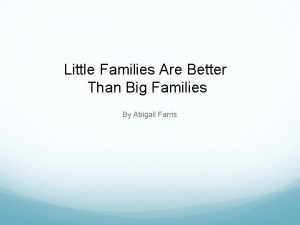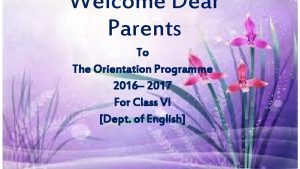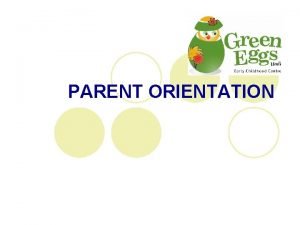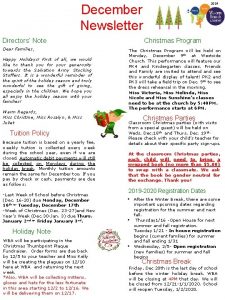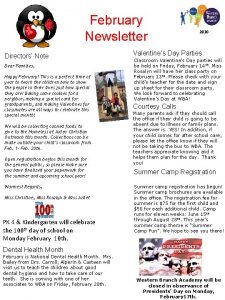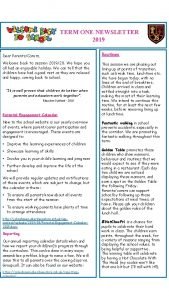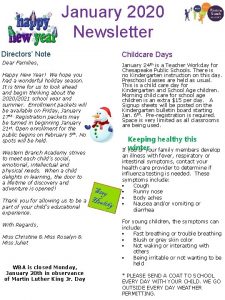TERM 1 NEWSLETTER Directors News Dear Families Welcome









- Slides: 9

TERM 1 NEWSLETTER Director’s News Dear Families, Welcome to our first newsletter for 2016. It’s been an exciting first few weeks of the learning year for families at Belford Oaks and most importantly for the children. Thank you to those of you who attended our Annual General Meeting, this indication of your willingness and desire to be part of your child’s centre. In a community-based centre such as ours, it is vital that we have the input and support from parents, in whatever capacity you can manage. The educators have set their goals for this year: • Exceeding in all Quality areas • Building Collaborative bonds with families and children. • Re-establish our sustainability practices At the end of 2016 our service is due to go through National Quality Assessment and Rating process. There are seven areas we will be rated on by the Department of Education and Early Childhood Development. • Quality Area 1 – Educational program and practice • Quality Area 2 – Children’s health and safety • Quality Area 3 - Physical environment • Quality Area 4 -Staff arrangements • Quality Area 5 - Relationships with childre 3 n • Quality Area 6 - Collaborative partnerships with families and communities • Quality Area 7 - Leadership and service management We have had Hand Foot and Mouth Disease going around the centre. People usually develop symptoms between three to seven days after being infected. The most common symptoms include: High temperature (fever), Sore throat, small, blister-like lesions that may occur on the inside of the mouth, sides of the tongue, palms of the hands, fingers, soles of the feet and ‘nappy’ area and children are often irritable, tired, and may be off their food. If you notice any of these symptoms please keep your child home from the centre. All children must obtain a clearance from the doctors before returning to the centre. For more information please go to: https: //www. betterhealth. vic. gov. au/health/conditionsandtreatments/hand-foot-and-mouth-disease Ending on a positive note we had enough funds to buy six new cots for the baby’s room and three new camera’s for each room. Regards, Barbara Up coming Events April. Monday 25 th- Anzac Day- Centre Closed Mayst Sunday 1 - Greek Easter Wednesday 18 th- Special Friend Day Thursday 26 th- National Day of Healing (national Sorry Day) June. Wednesday 1 st- International Children’s Day Sunday 5 th- World Environment Day Monday 13 th- Queens Birthday- Centre Closed Tuesday 21 st- Centre Art Show Friday 24 th Red Nose Day

Supervision Policy At Belford Oaks we are continuously reviewing our policies and procedures to ensure that they fall in line with current legislation and regulations. One of the policies we most recently reviewed was the Supervision Policy. SUPERVISION OF CHILDREN POLICY Best Practice – Quality Area 2 Purpose This policy will provide guidelines to ensure: • the provision of a safe and secure environment for all children at Belford Oaks CCC • adequate supervision of all enrolled children is maintained at all times. Policy Belford Oaks CCC is committed to: • providing adequate supervision of all enrolled children in all aspects of the service’s program • ensuring all children are directly and actively supervised by educators employed or engaged by Belford Oaks CCC • maintaining a duty of care (refer to Definitions) to all children at Belford Oaks CCC • Ensuring there is an understanding of the shared legal responsibility and accountability between, and a commitment by, all persons to implement the procedures and practices outlined in this policy. • Ensuring that children’s safety is protected in the service environment. • Recognising that adequate supervision requires teamwork and good communication between educators. • Ensuring that the relevant child to educator ratio specific to each age group is maintained at all times Relevant associated documents • Education and Care Services National Law Act 2010: Sections 165, 167, 169, 174 • Education and Care Services National Regulations 2011: Regulations 101, 168, 176 • National Quality Standard, Quality Area 2: Children’s Health and Safety Standard 2. 3: Each child is protected Element 2. 3. 1: Children are adequately supervised at all times • Occupational Health and Safety Act 2004 • Kidsafe: www. kidsafe. com. au • The Royal Children’s Hospital Melbourne Safety Centre: www. rch. org. au/safetycentre • Work. Safe Victoria: www. worksafe. vic. gov. au • Guide to the National Quality Standard (ACECQA) • Guide to the Education and Care Services National Law and the Education and Care Services National Regulations 2011 (ACECQA) Service policies • Child Protection Policy • Complaints and Grievances Policy • Dealing with Medical Conditions Policy • Excursions and Service Events Policy • Incident, Injury, Trauma and Illness Policy • Interactions with Children Policy • Occupational Health and Safety Policy • Staffing Policy

Supervision Policy Continued. Evaluation In order to assess whether the values and purposes of the policy have been achieved, the Approved Provider will: regularly seek feedback from everyone affected by the policy regarding its effectiveness record and monitor complaints and incidents in relation to the supervision of children and amend the policy and procedures as required keep the policy up to date with current legislation, research, policy and best practice revise the policy and procedures as part of the service’s policy review cycle, or as required Notify parents/guardians at least 14 days before making any changes to this policy or its procedures. Attachments Attachment 1: Supervision risk management template Authorisation This policy was adopted by the Approved Provider of Belford Oaks CCC on 24 th February 2016 Review Date: 2017

0 -2 Room News Dear Parents, Welcome to the Babies Room for 2016 It has been a very busy start to the year. We have quite a few children beginning childcare for the very first time, so it is a big change for them. It has been great to see the children becoming increasingly comfortable, confident and busy as they become familiar with their new environment, peers and Educators. At the beginning of the year, there is always a big focus on developing trusting and positive relationships with the children and strengthening the bond between our returning children and their Educators. The children are settling back into the routine of the room well, demonstrating confidence and independence in their actions. In the Babies Room we like to encourage the development and use of Self-help skills are very important for future development and learning. They give the children a sense of ownership, confidence in their abilities and allows them to feel confidant taking positive risks, discovering and exploring the world around them. Self-help skills include tasks such as helping to be responsible for their own belongings (putting their clothes in their lockers, collecting and putting away their sleep toys), collecting their own drink bottles and putting them away when they are done, feeding themselves, assisting in dressing and undressing themselves for rest times, putting on their bibs, putting them in the wash bucket and washing their hands and faces before and after meals etc. These are just some of the many important tasks and routines that the children happily take part in as a part of their day here at Belford. It has been great to see the returning children fall back into these routines so easily, even assisting some of our newer children in becoming familiar with these tasks. Fine and Gross Motor development In the babies room it is always a year-long focus to provide learning experiences and opportunities for the children to develop the important muscle groups vital for fine and gross motor movement. Fine motor skills are the coordination of small muscle movements which occur e. g. , in the fingers, usually in coordination with the eyes. Gross motor skills are movements that involve using the large muscles of the body. The development of gross motor skills starts as soon as a child is born. As children age, their gross motor abilities continue to develop and improve. We provide many opportunities throughout the day for the children to use and develop these muscles in a fun, engaging and open-ended learning environment. Jumping, climbing, running, dancing, bikes, play-dough, sensory play, blocks, loose part play and meal times are just some of the activities that the children engage in that help to develop these important muscles. Sensory Play Sensory play is a vital part of children's development, children learn through their sense of touch, sight, hearing, taste and smell. Open-ended play and sensory exploration is how your child collects information about their environment, interprets it, forms a hypothesis and makes sense of their world. Throughout their waking hours children are continually processing sensory information. Here at Belford Oaks we provide many opportunities for specific sensory play e. g. sand water play, but every learning experience that the children engage in will have a sensory aspect that helps your child form a foundation for future learning. With all of the hot weather we have been having Water play has been a reoccurring interest for the children. In the water trough we began with boats, the children explored with science and math concepts. They investigated the different ways they could manipulate and cause a reaction with the water, they experimented with floating and sinking and they explored the texture and feel of the water. Later in the term we swapped the boats out for Doll washing as the children have loved playing and exploring with the Home corner dolls.

0 -2 Room News Role-Playing and Communication From the moment that children are born they are having a conversation with you, through a series of non-verbal actions as well as babbling, gurgling, mimicry and observation. As they age they begin to use commonly heard and used words e. g. Mum, Dad, siblings names, favourite toys etc. Though they may not always use understandable words they are always communicating. Here at Belford Oaks we aim to provide a stimulating and safe environment where they children feel confident expressing themselves in whatever way they feel comfortable. The forming of trusting relationships between the children and the Educators at Belford Oaks adds to a sense of Belonging for the children, familiarity between the Educators and the children ensures that the children are being heard and understood in whatever capacity they wish to communicate. Role-playing is a fun and engaging way for the children to engage in both verbal and non-verbal communication. They develop important social and emotional skills, developing friendships through shared interests and learning experiences. They take on roles in society, that they have observed in the community, beginning to follow scripts from their home lives. Educators engaging in the role-playing with the children helps to scaffold the children’s language development, introducing new words and allowing them to become familiar with these new terms, in context. Inside we had the home corner with Dolls, cots, clothes and feeding utensils. The children used this area to explore with caring for young children. They dressed and undressed the dolls, fed them, put them to sleep and gave them toys to play with. The children repeated routines that they themselves had been a part of and had observed both at home and here at Belford. Outside we have a cooking experience in the cubby house. The children have enjoyed cooking up some yummy bread in the oven and sharing the fruit and vegetables with their friends. It has given them an opportunity to develop positive, trusting and reciprocal relationships with their peers who share the same interests in a safe, engaging and familiar environment. House Keeping Please provide at least 3 changes of weather appropriate clothing. The children are always very busy outside and do take part in sensory play, so please send them in clothes that are ok to get dirty, we do try and use smocks when necessary but children do love to get messy! We are a Sun. Smart centre so please send a hat for your child, preferably with a chin strap for the younger children. Please label everything so that we can ensure that the right belongings are going home with the right children, this includes: Dummies, Shoes, Bottles and hats. (As well as their clothing) We look forward to an exciting and meaningful year in the Babies Room. As always if you have any questions or need to speak to us regarding your child’s time in the Babies Room, changes in routine, their development or anything else please feel free to email us or talk to us when you are next in. Thank-you, Emma, Starr and Jackie

Toddler Room News Dear Parents, Welcome to 2016 in the Toddler Room. A big welcome to all of our families. We have had two new children start with us at Belford Oaks and they are settling in well. Our main focus for term 1 has been for the children to develop strong bonds with familiar educators, settle in and explore their new environment. The children have settled well into the room and are exploring every aspect of the program. Self help and Independence: Throughout the year we will continue to work on the children’s self help skills, independence and becoming responsible for their own belongings. At meal times the children are provided with opportunity to serve themselves, scrape their plates and place them on the bench when they have finished. At sleep/rest time we encourage the children to begin to undress and dress themselves. We understand that sometimes they may have difficulty with certain items of clothing and that is when we are there to assist them when they require it. We are encouraging the children to be responsible for their own belongings like hats, drink bottle and any comforters that they may have. Overall the children are doing an amazing job with putting their hats, jackets, comforters away in their lockers and placing their drink bottles back in the crate when they have finished with it. It is wonderful to see the progress that the children have made in last two months. By encouraging the children to do these simple things, develops a sense of achievement, confidence and responsibility with in their environment. Indoor/Outdoor Play: At Belford Oaks we provide the children with opportunity to choose where they would like to play through offering an indoor/outdoor program. This allows the children to develop a sense of agency, provides more choices of experiences and more time to engage in experiences that they enjoy. Messy Play: Messy play can come in many different forms of play. It can be the mud patch, and pit, painting, sensory experiences like goop. All of these experiences promote the children’s sensory exploration, creativity, imagination and language skills. We understand that the children may end up dirty from these experiences, so w just ask that you provide at least three changes of clothes in your child’s bag so that we can change them if they do become messy. Art and Craft Trolley: In the toddler room we recently purchased an art and craft trolley. This has been a big hit with in the room. The children are being provided with the opportunity to explore drawing, pasting, cutting, stamping and sticking with sticky tape. Providing the children with a variety of mediums encourages creativity, exploration, language and for the children to engage in solitary or social play. Group Time: Each day the children take part in a group time with educators. The children enjoy singing songs and reading stories which has led to many different discussions. We encourage all children to take part in the group experiences and choose songs to sing. Group times encourage the children to express themselves and their points of view, share ideas and thoughts, develop confidence speaking in front of a group and learning from one another. Social Interactions: We are currently working on social play with the children encouraging them to express themselves verbally to one another and engage in positive play. Educators are modelling appropriate language, providing guidance and reassurance throughout the children’s play to encourage communication, language development and positive social interactions. Portfolios: At Belford Oaks, each child’s learning and development is documented by the educators in the room. The educators write a learning story which is then analysed and followed up to extend on the children’s development. Each child in the room has their own portfolio which will contain a variety of things like individual learning stories, group learning stories, art work, observations and photos. If you have any questions about your child, the room or the program please do not hesitate to talk to one of the room educators. Thank you Suzie, Holly and Bruno

Kinder Room News Dear Parents, A very warm welcome to all our new families in the Kinder Room for 2016, and welcome back to those of you who are returning for another year of fun and learning. It has been a busy and amazing start to the kinder year. I would like to mention also how well all the children have settled into the start of the kinder year. I can safely say this is due to the wonderful environment that Penelope, Shirley and myself provide for them. The program is excellent, with lots of familiarization and routine to get them settled. Paintings and box construction are an all time hit. Be prepared to leave a wall or shelf empty at your home that you can happily display your child’s masterpieces over the year. Encouraging children’s independence and building a strong foundation for future learning: 1. Encourage children to get dressed on their own. 2. Encourage children to put their own socks and shoes on. Buckle and laces are sometimes tricky so they may need some assistance with these. 3. Allow the children to put their dishes away, set the table or pack it away. 4. Encourage your children to help at cooking time. 5. Put their own bag in their locker. 6. Put their own locker tag on their locker. 7. Applying their own sunscreen. 8. Encourage children to have morning and night time routine, including going to bed and waking up at the same times every day to make it easier for them when they go to school. These are just suggestions, and we are not suggesting that you leave them to their own devices. We understand that it is sometimes easier for parents to step in, however in the long run we are encouraging self help skills and showing the children that we respect their abilities and attempts to do things on their own without help. Which in turn will give them a sense of independence and self confidence. The children all seem to settling in and have some great inspirational learning. At the moment we have had a number of discussions about butterflies. How they become butterflies, the life cycle and their patterns on their wings. To extend on the children’s learning and interests we have set up a variety of learning experiences for children to explore. We learned a number of great words such as, chrysalis and metamorphosis. We also realized that before it turns into a butterfly it’s a caterpillar and it sheds it skin several times as it grows bigger and bigger. We have also had some great extensions on this experience through the children painting, sequencing the life cycle of the caterpillar and tracing butterflies and expressing their ideas. We have talking with the children during group times about how e can look after each other and they stay at kinder and they have been coming up with lots of ideas, which have formed the basis of group’s rules which we are encouraging the children to follow. The children’s portfolios are now prepared and we are have just commenced adding some items to them. The Portfolios will contain individual learning stories, group learning stories, photos and artwork. These will be available for the children to pursue and reflect on their own learning. They can sit, have discussions with their friends or just enjoy some time alone looking at them. Families are welcome to view them at any time. Please see educators and we can direct you to where they are. Thank you Connie, Penelope and Shirley. Our goal is to develop a sense of belonging being and becoming.

Kitchen News Well welcome to 2016, The children are enjoying the summer menu, they are making their own rolls, with salads and the lighter meals, but still getting all the nutrition they need for the day. We celebrated Chinese’s New Year last month, with sweet and sour pork and fried rice. We then celebrated Shrove Tuesday with an afternoon of pancakes, which the children always enjoy. Sweet and sour pork It's easier to make sweet and sour sauce than you might think - and healthier too! This one uses fresh pineapple but you could easily substitute it for tinned. Serves: 6 Ingredients 500 g pork fillet, chopped into bite-sized pieces 3 teaspoons salt-reduced soy sauce 1/3 cup sugar 2 tablespoons tomato sauce 1/3 cup vinegar 1 tablespoon cornflour 3 teaspoons vegetable oil 1 cup fresh pineapple, chopped 1 red capsicum, seeds and pith removed, chopped 1 large onion, quartered and chopped roughly 4 cups of rice Method 1. Place the pork in a non-metallic bowl, and add soy sauce. Toss through so all the pork pieces are coated. Set aside. 2. Prepare rice in a rice cooker 3. In a medium saucepan over low to medium heat, whisk together the sugar, tomato sauce, vinegar, and cornflour and allow to simmer. 4. Meanwhile, bring a wok or large non-stick frying pan to a high heat, then add 2 teaspoons oil. Swirl the oil around so the bottom is coated. 5. Toss in the pineapple, capsicum, and onion and stir-fry for about 4 minutes until they begin to caramelize. 6. Add the warm sauce and remove from the wok and set aside. 7. Add another teaspoon of oil to the wok, and then add the pork and cook until the pork is browned and just cooked through, about 8 minutes. 8. Add the sauce and vegetables, allow to come to a simmer then remove from heat. 9. Serve and enjoy

Kitchen News Allergies and Intolerances Food allergies & intolerances Children are often diagnosed with food allergies or intolerances, but what does that mean? A true food allergy is one that elicits an immune response reacting to a protein found in the food. The body reacts because it does not recognise the protein and thinks it’s toxic or harmful to the body. The immune system mounts an attack on this threat which can lead to symptoms such as hives, swelling, and closing of the airways, pain, vomiting or diarrhoea. Food allergies can be fatal. There must be complete avoidance of foods containing the food allergen to prevent a reaction. Food intolerances, however, do not involve the immune system but involve an accumulation of naturally occurring food chemicals or additives that are consumed past the body’s tolerance level for that chemical. Some people are more sensitive to food chemicals then others and will exhibit symptoms a lot more quickly. These reactions are more common than allergies. Intolerances are often associated with diarrhoea, headaches and asthma-like symptoms. However it is important to note that the symptoms caused by intolerances and allergies can be similar. What are the common causes of food allergies? Ninety percent of food allergies are caused by nuts, eggs, milk or soy. Among children, peanut allergy is the most common and can often result in anaphylaxis. What are the common causes of food intolerances? Common intolerances include lactose intolerance, which is when the body is unable to process lactose, a natural sugar that is found in cow’s milk and products such as ice cream, cheese and yoghurt. Some people may be intolerant to naturally occurring food chemicals including glutamates, salicylates and amines, or artificial ones including some colours. Glutamate is found naturally in many foods as it improves the flavour of the food. Tomatoes, mushroom, cheese are high in glutamates, pure glutamate in the form of monosodium glutamate (MSG) can be added to soups, Asian cooking and snacks to enhance flavour. Salicylates are chemicals found naturally in fruits, vegetables, nuts, herbs and spices, honey, juices and many other foods. While amines are found in cheese, chocolate and certain fruits including bananas and avocados. If you’re intolerant to naturally occurring food chemicals, there is a high likelihood that you will be allergic to other food additives. It is important to consult your doctor or an Accredited Practising Dietician for diagnosis. Is Coeliac Disease an allergy? Or intolerance? Children can suffer from wheat allergies and gluten intolerance, however coeliac disease does not fall into either of these categories, as it is an autoimmune disease. What should I do if my child has an intolerance or allergy? If your child suffers from an allergy, it is vital to create an action plan should an allergic reaction occur. The Australian Society of Clinical Immunology and Allergy (ASCIA) have created templates that can be filled out by GPs and information passed onto parents, caregivers and schoolteachers of the child. You can find it here: http: //www. allergy. org. au/health-professionals/anaphylaxis-resources/ascia-action-plan-for-anaphylaxis As a parent, approach your school to discuss your child’s allergies and their food requirements. Government schools are required to develop an individual health care plan for each student with allergies. Visit your school canteen and make them aware of who your child is and foods that are safe for their consumption. It is important to note that schools are not required to ban any known food allergens or food that “may contain” a known allergen. For more information on what canteens can do to minimise risk of an allergic reaction. Cheers Monique

